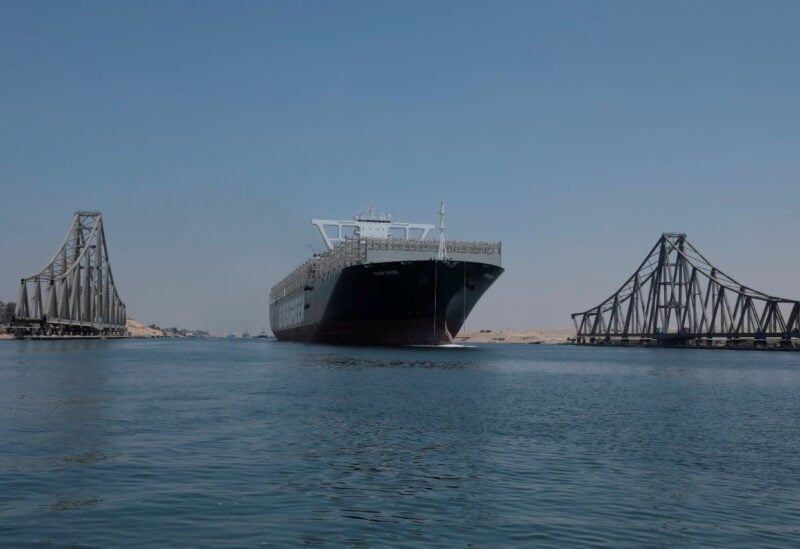
Ever Given, one of the world's largest container ships, is seen after sailing through Suez Canal in Ismailia, Egypt August 20, 2021. Suez Canal Authority/Handout via REUTERS
Egypt plans to raise fees for ships passing through the Suez Canal by 15% in 2023, the Canal Authority’s Chairman Osama Rabie said on Saturday.
Transit fees for bulk and tourist ships will be raised by 10%, Rabie added.
The fee increase will be applied starting Jan 1, 2023.
Rabie confirmed in a press statement on Saturday the Authority’s keenness to apply a balanced and flexible strategy on pricing and marketing that serves its own interest and that of its clients.
“The strategy also takes into consideration the various changes in global economy through clear mechanisms that include calculating a vessel’s transit tolls depending on the savings it achieves by transiting through the Canal.”
This system works with navigational circulars issued and updated by the Authority according to real-time changes for all the categories of transiting vessels, which allows for amending the transit tolls effectively in case of changes in the global navigation market, the statement read.
“This eventually allows for providing navigational services for transiting vessels that are in line with the Authority’s standards policy to ensure the Canal’s position at the forefront as the world’s optimal, fastest and shortest route for all clients,” Rabie added.
Commenting on the reasons behind raising the fees, Rabie said they come in light of the Authority’s efforts to stay up-to-date with all the market changes in the maritime transport sector that monitor the ever-increasing daily charter rates for most types of vessels that reached unprecedented levels, adding that the forecast for next year shows a continuation in this rise.
He cited examples in the daily charter rates for crude oil tankers which increased in average by 88% compared to the average rates of 2021, and an increase by 11% in the average daily charter rates of LNG carriers compared to that of 2021.
“Determining the Suez Canal transit tolls rests on a number of pillars, most significant of which is the average freight rates for various types of vessels.”
“This will be reflected in the high operational profits that will be achieved by navigational lines throughout 2023, in light of the continued impact of the disturbances in global supply chains and the congestion in ports world-wide, as well as the fact that shipping lines have secured long-term shipping contracts at very high rates.”
Rabie also pointed out to the impact the increased energy prices have on the equation of tolls calculation.
The continued increase in crude oil prices over $90 per barrel and the increase in the average LNG prices above $30 per million thermal units have led to a rise in the average prices of ships bunker, and consequently an increase in the savings ships achieve by transiting through the Suez Canal compared to other alternative routes.
He also stated that the increase is inevitable and a necessity in light of the current global inflation rates that reached more than 8%, which translates into increased operational costs and the costs of the navigational services provided in the Canal.
Rabie further explained that the Authority adopts a number of mechanisms with the sole aim of having its pricing policies cope with the changes in the maritime transport market and to ensure that the Canal remains the most efficient and least costly route compared to alternative routes.
The Authority does so by publishing a number of navigational circulars that allow for amending the pricing policies in case of any changes in the navigation market by offering incentives to vessels that operate on routes where the Suez Canal wouldn’t normally achieve considerable savings, the statement noted.
These rebates may reach 75% of the Canal standard transit tolls for a specific period as per what the market dictates.
Rabies also pointed to the rebates granted through the Authority’s long haul committee that study each applying vessel’s journey one at a time, which may reach 74% of the Canal standard transit tolls according to the conditions of the navigation market at the time the client applies for the rebate.
“This also applies to vessels that operate on routes where the Suez Canal wouldn’t normally achieve considerable savings,” the statement explained.